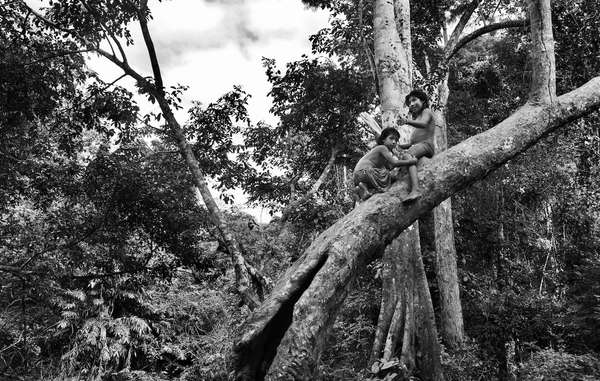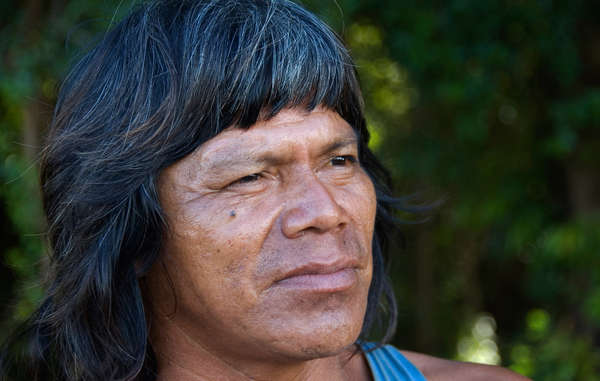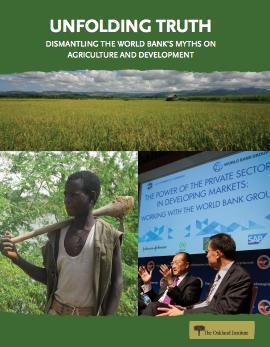Alternative News
Articles from non-mainstream as opposed to corporate for profit sources.
Eden Project photo exhibition showcases tribal people of the rainforest - News from Survival
- Details
- Published on Wednesday, 22 October 2014 16:06
- Written by editor

Eden Project photo exhibition showcases tribal people of the rainforest
 Sebastião Salgado's stunning images of the Awá tribe in Brazil's Amazon rainforest, taken in 2013, will be showcased in the Rainforest Biome of the Eden Project in Cornwall, UK. The Awá are finding it increasingly difficult to hunt game in the forest, and have been brutally attacked by loggers while out hunting.© Sebastião Salgado/Amazonas/nbpictures
Sebastião Salgado's stunning images of the Awá tribe in Brazil's Amazon rainforest, taken in 2013, will be showcased in the Rainforest Biome of the Eden Project in Cornwall, UK. The Awá are finding it increasingly difficult to hunt game in the forest, and have been brutally attacked by loggers while out hunting.© Sebastião Salgado/Amazonas/nbpictures
Stunning photographs of tribal people of the rainforest by Cornish explorer and writer Robin Hanbury-Tenison and world-renowned Brazilian photographer Sebastião Salgado will go on display at the UK’s Eden Project from Friday, October 24, 2014.
The exhibition – called “People of the Rainforest” – will be on display in Eden’s Rainforest Biome. The images were taken in the Amazon rainforest, Sumatra, Borneo and Malaysia, and will be installed in the corresponding areas of the Biome.
The pictures have been specially selected to remind visitors to Eden that an estimated 200 million indigenous people around the world depend on forests for their home and livelihood.
The exhibition was prompted by a letter from Eden Project co-founder Sir Tim Smit to Robin Hanbury-Tenison suggesting that the themes of people and forests were drawn together at Eden.
Eden has worked with Survival International, the global movement for tribal peoples’ rights, to bring the exhibition to Cornwall. Survival International was founded 45 years ago by a group of people, including Robin Hanbury-Tenison, who were appalled by the genocide of Amazon Indians in Brazil.
 A nomadic Penan hunter-gatherer in Sarawak, Malaysia, using a blowpipe (1976). His loincloth is made from a long strip of soft, beaten bark, and around his waist is everything he needs in the forest: a sharp parang in its wooden sheath and a small container to hold spare poison darts.© Robin Hanbury-Tenison
A nomadic Penan hunter-gatherer in Sarawak, Malaysia, using a blowpipe (1976). His loincloth is made from a long strip of soft, beaten bark, and around his waist is everything he needs in the forest: a sharp parang in its wooden sheath and a small container to hold spare poison darts.© Robin Hanbury-Tenison
Boo! Take action on the Energy East climate nightmare this Halloween.
- Details
- Published on Wednesday, 22 October 2014 15:30
- Written by editor
Friends,
Climate change is scary business. Wildfires, drought, rising seas -- the reality of climate change is a frightening prospect.
But do you know what's particularly scary here in Canada this Halloween? Despite the clear threat of climate change, the largest tar sands pipeline ever proposed, TransCanada's Energy East project, won't be receiving a climate review. This thing is being waived on through -- even with a climate impact equal to over 7 million cars!
This Halloween, we're shining a light on the Energy East climate nightmare. We're going to put the scare into politicians and demand that they start taking the climate impact of this pipeline seriously.
Will you join in? Click here to lead an action in your community.
On October 30th and 31st, we plan to carve and deliver hundreds of #NoEnergyEast Jack-o-Lanterns to elected officials all along the pipeline route. So far, the media and politicians have been hiding from the climate impact...
Read more: Boo! Take action on the Energy East climate nightmare this Halloween.
ITUC Newsletter 51: OHS, IMF and World Bank, ILO.. Latest News from the ITUC
- Details
- Published on Wednesday, 22 October 2014 02:00
- Written by editor
Read more: ITUC Newsletter 51: OHS, IMF and World Bank, ILO.. Latest News from the ITUC
[!] It's Time to Take Action on Permaculture
- Details
- Published on Tuesday, 21 October 2014 22:20
- Written by editor
 Hello
there!
Hello
there!
There is only 1 day remaining on the extended offer! 1 day left to enroll in the Online Permaculture Designer Certificate Program and pay $290 instead of $525.
We’ve done the talking. We’ve covered all of t he highlights of the course.
We’ve laid out the benefits.
he highlights of the course.
We’ve laid out the benefits.
Now it’s up to you to take action.
Prove to the world and to yourself that you are serious about making a positive difference in the world.
Whether you plan on using this professional certificate to enhance your career or not, it is
a wonderful foundation to have. You’ll get the skills, experience,
and confidence needed to have success in any permaculture project you take
on.
Tragedy strikes Colombia's Sierra Nevada Indians - News from Survival
- Details
- Published on Tuesday, 21 October 2014 16:40
- Written by editor

Tragedy strikes Colombia’s Sierra Nevada Indians
 Arhuaco Indians, Colombia
© Survival International
Arhuaco Indians, Colombia
© Survival International
A series of tragic events has hit Colombia’s Arhuaco, Kogi and Wiwa tribes in the Sierra Nevada de Santa Marta region of northern Colombia.
On 6 October eleven Wiwa Indians were killed after a lighting bolt struck a communal building where sixty of the tribe’s leaders were meeting.
Amongst the dead were “mamos” or spiritual leaders, and health experts.
The following day, five Arhuaco children and the mother of one of the children were killed by a landslide that destroyed their home.
On 14 October, Jacinto Sauna Zarabata, the son of the Kogi tribe’s leader was shot dead. Jacinto was at home with his partner when he was killed.
Jacinto’s father, José de los Santos Sauna, told press he had received death threats in the past, but the motive of his son’s death remains unknown.
In a statement, Sierra Nevada Indian organization Gonawindúa Tayrona said, “We hope that the perpetrators of this crime are brought to justice, and not forgotten like so many others, such as the murders of our leaders Napoleón Torres, Ángel María Torres and Hugues Chaparro, killed 22 years ago, or the attempted murder of Arhuaco leader Rogelio Mejía Izquierdo two years ago.”
“When they found him, he was dead.”Dilia’s husband was murdered and tortured more than 22 years ago. His killers still evade justice.The Sierra Nevada Indians believe it is their responsibility to maintain the balance of the universe, and that natural disasters are a consequence of human failure to keep that balance.
Read more: Tragedy strikes Colombia's Sierra Nevada Indians - News from Survival
Will it soon be payback time for fossil fuel companies?
- Details
- Published on Wednesday, 22 October 2014 00:00
- Written by editor
 In this issue:
In this issue: Dear PAOV,
In this issue: Take action immediately to protect marine species and ecosystems from fish farm dumping and vote for the 2014 People’s Choice for the Andrew Thompson Award.
Also read on about how legal challenges – both against the proposed Enbridge pipeline and tankers proposal and against large-scale GHG producers throughout Canada – should have the fossil fuel industry seriously spooked this Halloween. In addition we are sharing our newly released
Read more: Will it soon be payback time for fossil fuel companies?
FIVE CAMPERS ARRESTED FOR REFUSING TO LEAVE OPPENHEIMER PARK
- Details
- Published on Tuesday, 21 October 2014 11:20
- Written by editor
Vancouver Police made five arrests at Oppenheimer Park as city crews dismantled the last remaining tents.
Officers made their way into the park shortly after 10:00 a.m. this morning asking campers to abide by the BC Supreme Court order requiring them to pack up their belongings and allow city workers to clean up the park.
Everyone had been well informed by police and others that failing to comply with the court order may result in arrest. The vast majority of campers were cooperative allowing work to restore the park to continue.
A small number of campers who appeared intent on remaining in the park interfered with workers as they attempted to remove the last of the tents. Negotiations throughout the day continued with no progress. Officers were eventually required to step in to keep the peace and forced to arrest five people.
Three men and two women were taken to jail. Police will be considering recommending charges of obstruction and breach of a court injunction.
Read more: FIVE CAMPERS ARRESTED FOR REFUSING TO LEAVE OPPENHEIMER PARK
Bye, bye, bees
- Details
- Published on Tuesday, 21 October 2014 11:00
- Written by editor
Pesticide giant Bayer wants to introduce ANOTHER pesticide, one that could make the bee die-off even worse.
The government is accepting comments -- but we've only got a small window of opportunity. Tell the government to stand up for the bees and reject Bayer's new proposal.
Across the country last winter, we lost almost 30 percent of its bee colonies, and strikingly, in Ontario, over 50 percent of the bees colonies did not survive. Bees are already dying in record numbers. Judging on what these pesticides have done to our bees so far, we could see the complete decimation of the population sooner than we think if pesticide giant Bayer gets its new poisonous pesticide approved.
The final decision lies with Health Canada , and a crucial public comment period is about to close on November 1. If we want Health Canada to stand up to Bayer, it needs to hear from us now.
Bees are diligent, unassuming creatures. They pollinate our crops, and are responsible for one out of every three bites of food we eat. It’s simple -- no bees means no food for us.
This new pesticide, Flupyradifurone, belongs to a class of pesticides called “neonics”. Approving this new pesticide is very risky given that similar types of neonics have been deemed so harmful that they have been banned in Europe. This new pesticide not only has the potential to escalate the bee die-off, it could also contaminate groundwater and aquifers.
Heres how to stop excessive secrecy in government now
- Details
- Published on Tuesday, 21 October 2014 11:00
- Written by editor
Having trouble viewing this email? This email address is being protected from spambots. You need JavaScript enabled to view it.&u=http%3A//democracywatch.ca/%3Fwpmlmethod%3Dnewsletter%26id%3D144%26mailinglist_id%3D38%26subscriber_id%3D49215%26authkey%3D5b69b9cb83065d403869739ae7f0995e">View Online This email address is being protected from spambots. You need JavaScript enabled to view it.&u=http%3A//democracywatch.ca">
 This email address is being protected from spambots. You need JavaScript enabled to view it.
This email address is being protected from spambots. You need JavaScript enabled to view it.&u=http%3A//www.facebook.com/DemocracyWatch">
This email address is being protected from spambots. You need JavaScript enabled to view it.
This email address is being protected from spambots. You need JavaScript enabled to view it.&u=http%3A//www.facebook.com/DemocracyWatch">
You can help push for key changes to end excessive secrecy in government – especially in the federal government
Since 2012, the federal Conservative government has been claiming to have an open government plan. In fact, every independent report has shown more excessive secrecy in the federal government than any time since the so-called Access to Information law passed in 1983.
The law is so weak it really should be called the “Guide to Keeping Government Information Secret” law.
Right now Conservative Cabinet minister Tony Clement is proposing a plan to the international Open Government Partnership that will only make already public information a bit more easily accessible.
This will do nothing to end secrecy that encourages waste, abuses and corruption – the law needs to be strengthened to require more transparency, with stronger enforcement and penalties for anyone who keeps information secret that the public has a right to know!
Please This email address is being protected from spambots. You need JavaScript enabled to view it.&u=http%3A//democracywatch.ca/campaigns/open-government-campaign/">click here to send your letter now calling on the federal Conservatives, and governments across Canada, to make key changes to laws to open up government and make it more accountable to you.
Read more: Heres how to stop excessive secrecy in government now
Who do you trust with your child care futuMulcair or Harper?
- Details
- Published on Tuesday, 21 October 2014 11:00
- Written by editor

17 Oct 2014
Child care has been at the forefront of our Parliamentary news this week, as the NDP announces its national child care strategy -- and the Conservatives launch into campaign-mode spin. Who do you trust with your child care future? Read Karl Nerenberg's report on the launch and keep up on the latest in our reporting from Parliament Hill here. (Need more reasons to support our Parliamentary Bureau? Here are 7 great ones.)
If you want to see more of this kind of reporting, please kick in $3 towards our Parliamentary reporting right now.
Pulitzer-prize winning journalist Glenn Greenwald is coming to Ottawa October 25! He will speak about privacy, state surveillance, and its impact on Canadians at an event sponsored and livestreamed by rabble.ca. Find all the detail here.
Also coming up in Ottawa, the third Women's Forum, hosted by MP Niki Ashton, will be taking place in Ottawa on October 30th. Find out how you can participate online or register to join in person by clicking here.
Long Live Occupy: Occupy, three years later: Judy Rebick reflects back - and looks ahead at Occupy's influence. This is the first in a our new series Occupy is dead. Long Live Occupy.
This week's top news
Bill C-36: No safety or security for sex workers
Bill C-36 was passed in the House of Commons last week. And a lot of people, including sex workers, are not pleased. Will this bill continue to contribute to sex workers' rights violations?
By Cheryl Auger
Read more: Who do you trust with your child care futuMulcair or Harper?
Backlash Canada Post
- Details
- Published on Tuesday, 21 October 2014 11:00
- Written by editor
I'm heading to Ottawa on Tuesday to deliver my petition in person! Can you help us help us reach 200,000 signatures before then?

Have you ever tried to push a wheelchair through the mud or snow?
That’s the question I asked the government and Canada Post almost a year ago, when I learned that I would be one of millions of Canadians who may have to travel kilometres just to get our mail. My youngest son has cerebral palsy - for me and every other Canadian dealing with mobility challenges, Canada Post’s plan to end home delivery would mean a difficult and even dangerous walk to get the mail.
I felt angry and helpless, so I started a petition. I didn’t think my petition would go anywhere, but boy was I wrong! Since then, over 154,000 Canadians have joined our fight to save home mail delivery, and have stood up to defend those who would most feel the impact - people with young children, the disabled, the elderly, and those who care for them.
There’s more - mayors and councils in cities and towns across Canada are fighting back with resolutions against Canada Post’s decision. We also learned that Canada Post is making a profit again, which erases the whole reason they said this was necessary.
If you ask me, the government never expected this public backlash - they’re beginning to realise that this issue isn’t going away, and that we won’t let them quietly turn Canada into the only developed nation in the world that doesn’t deliver the mail.
That’s why on Tuesday I’ll be heading to Ottawa to deliver my petition in person! We'll be demanding answers from our government, which has yet to explain how this decision makes any sense - especially for those of us who are already in difficult situations, and will have to struggle to cope with yet another daily challenge.
Unsustainable McDonalds
- Details
- Published on Tuesday, 21 October 2014 10:40
- Written by editor
McDonald's just signed a historic pledge to combat deforestation -- but it continues to buy palm oil made from destroying the last remaining habitat of the Sumantran tiger.
Tell McDonald's to only buy palm oil from responsible suppliers. 
McDonald’s is using unsustainable palm oil, and it’s not good news for the Sumatran tiger or Borneo pygmy elephant: their rainforest homes are being systematically destroyed for massive palm oil plantations in Southeast Asia.
The palm oil industry’s rampage is also fueling climate change -- releasing billions of of tons of greenhouse gases every year, and making Indonesia the world’s third largest climate polluter.
But due to pressure from people like us, the largest palm oil producers have promised to halt deforestation for one year. Now we have an opportunity to fundamentally change how major companies like McDonald’s source their palm oil -- or the tiger, the orangutan, and the elephant will be at risk once again.
Tell McDonald's to seize this opportunity and adopt a responsible palm oil policy.
McDonald's buys palm oil to make a range of products -- from Baked Apple Pie to Spicy Chicken McBites. If we could get McDonalds to adopt a no-deforestation palm oil policy, it would show the palm oil producers that there's no going back. The palm oil industry would be forced to make its one year separation from deforestation permanent, if it wants to sell to leading consumer brands in the future.
Survival calls for release of journalists and political prisoners in West Papua - News from Survival
- Details
- Published on Saturday, 18 October 2014 16:00
- Written by editor

Survival calls for release of journalists and political prisoners in West Papua
 Papuan tribal people have suffered immensely from Indonesian military brutality since 1963.© Survival
Papuan tribal people have suffered immensely from Indonesian military brutality since 1963.© Survival
French journalists Thomas Dandois and Valentine Bourrat face trial by the Indonesian authorities in West Papua on October 20, 2014, on charges of “abusive use of entry visas”, after being arrested while making a documentary film in August.
Dandois and Bourrat were arrested after meeting with Areki Wanimbo, the head of the Lani Besar Tribal Council in the Papuan highlands, who has also been detained.
Wanimbo is now facing charges of “conspiracy to commit treason”, a charge that is applied to a wide variety of “offences” including peaceful political activities and possession of flags.
The journalists could face up to five years in prison and a fine of 500 million Rupiah ($41,000).
Survival International, the global movement for tribal peoples’ rights, calls for the release of the two journalists, and for an end to restrictions on foreign media in West Papua. Survival also highlights the plight of Papuan tribal people who have suffered immensely under a brutal Indonesian occupation since 1963. Many have been jailed for peacefully expressing their views.
According to Papuans Behind Bars, at least 74 Papuan political prisoners were being held in Indonesia in September 2014. Many have suffered arbitrary arrest, torture, violence, abuse, unfair trials and neglect. Survival is calling for their unconditional release.
Cacouna, Couillard and the Ties that Bind
- Details
- Published on Thursday, 16 October 2014 21:00
- Written by editor
~~~~~~~~~~~~~~~(((( T h e B u l l e t ))))~~~~~~~~~~~~~~~
A Socialist Project e-bulletin .... No. 1048 .... October 17, 2014
____________________________________________________
Cacouna, Couillard and the Ties that Bind
Quebec Government’s Love Affair with Big Oil
Gabriel Nadeau-Dubois
It's an evening like any other. The first item on the Téléjournal is about the controversial Cacouna oil port project. The journalist speaks to citizens in favour of and opposed to the project. Then the spokesperson for TransCanada, the project's sponsor, appears onscreen. His talking points aren't particularly noteworthy, but his face is strangely familiar. I've seen it before, but where? For hours, the question nagged at me. Later that evening, it came to me in a flash: we had crossed paths during the summer of 2012 in Quebec, during negotiations between the student movement and the Jean Charest government.
I pulled up the Alberta company's website...
Competing visions for child care, role of govt
- Details
- Published on Thursday, 16 October 2014 13:20
- Written by editor
The NDP's proposed $15-a-day national child care program has triggered an interesting national debate about child care and the role of govt.
We've produced two posts that advances the argument for a progressive vision.
Take a look, and share on FB and Twitter if you can:
http://www.pressprogress.ca/en/post/conservatives-already-singing-tea-party-hymnbook-child-care-attack
http://www.pressprogress.ca/en/post/7-perfectly-sensible-reasons-why-child-care-good-economy
Sarah
"We'll die for our lands", Guarani Indians declare in Brazil's capital - News from Survival
- Details
- Published on Thursday, 16 October 2014 13:20
- Written by editor

"We'll die for our lands", Guarani Indians declare in Brazil's capital
 Forty Guarani leaders traveled over 1,000 km to Brasília to insist that the authorities map out their ancestral land.© CIMI
Forty Guarani leaders traveled over 1,000 km to Brasília to insist that the authorities map out their ancestral land.© CIMI
Forty Guarani Indian leaders have traveled over 1,000 km to Brazil’s capital to insist that the authorities map out their ancestral land before more of their relatives are killed.
The delegation expressed its dismay at a recent High Court ruling which, if upheld, will be a huge setback for the land campaign of one community whose internationally renowned leader, Ambrósio Vilhalva, was killed last year.
In response to the government’s failure to fulfil its legal duty to map out the Guarani’s lands for their use, the leaders declared “We can’t wait any more for the government to keep its promise… We will resist, and we’ll die for our lands.”
This resistance takes the form of land reoccupations, which often result in violence but which the Guarani see as the only way to return to their land. One community, Kurussu Mba, has been attacked by gunmen three times since it reoccupied part of its land last month and the Indians now face a court order threatening to evict them imminently.
 Guarani leader Ambrósio Vilhalva was killed last year.© Fiona Watson/Survival
Guarani leader Ambrósio Vilhalva was killed last year.© Fiona Watson/Survival
Proposed Law Exposes BC Non-Profits to Attack
- Details
- Published on Thursday, 16 October 2014 11:20
- Written by editor
Anybody could ask court to punish a group they think is acting 'detrimental to the public interest.'
Running small non-profit organizations in British Columbia will become much more difficult if the government proceeds with a proposed change that will make it easy for opponents to tie them up in court, say critics of the province's direction.
"They are making life for organizations like ours more complicated," said Jim Wright, the president of the Garden City Conservation Society in Richmond.
There are some 27,000 registered societies in B.C., according to the government. They fulfil a broad range of functions, everything from providing services such as running long-term care homes to advocating on issues.
In August, the province's Finance Minister Mike de Jong released a white paper outlining a new Society Act. While much of it appears innocuous, a section that would allow members of the public to apply to the B.C. Supreme Court to intervene if they believe a society is acting "detrimental to the public interest" is beginning to draw attention.
"This provision is unique in corporate law, and reflects the special role of non-profit corporations in society," reads the white paper. "There is a general expectation that societies will act in the public interest, especially since so many of them are supported by public funding or monies solicited from the public."
Worrisome change
The proposed change worries Wright, whose group has fought to protect farmland in the Lower Mainland. "It is a concern because a powerful party that wants to suppress what a particular society is advocating can easily do so," he said.
Carter Captures the Nation's Attention
- Details
- Published on Wednesday, 15 October 2014 18:00
- Written by editor
Seven reasons to support a Parliamentary Bureau for the rest of us
- Details
- Published on Wednesday, 15 October 2014 16:20
- Written by editor

>>Seven reasons to support a Parliamentary Bureau for the rest of us. You can do so right here: https://secure.rabble.ca/donate
Dear Friend,
Here at rabble.ca we strongly believe that Canada needs more independent reporting coming out of Parliament Hill.
In 2011, frustrated with the coverage of Parliament and the Prime Minister's Office, we crowdfunded a journalist to report on the Hill for the rest of us.
Our readers came through and we sent Karl Nerenberg to do the job. Our reporting is not funded by corporations, governments or foundations: we need community support to keep our Parliamentary Office open (you can give your support right here, right now).
Why support a Karl Nerenberg to head up a Parliamentary Bureau for the rest of us? Here are seven reasons:
1. He's no newbie. Karl brings 25 years experience, including eight years at the producer of the CBC show The House, to rabble's Parliamentary Bureau. He has written scripts for documentary films and long-form television reports for such shows as Le Point and Actuel on Radio Canada television and The Journal on CBC-TV. Karl also founded and, for five years, edited the magazine Federations: What's new in federalism worldwide . He knows how to get the scoop.
Read more: Seven reasons to support a Parliamentary Bureau for the rest of us
Unfolding Truth: Dismantling the World Banks Myths on Agriculture and Development
- Details
- Published on Wednesday, 15 October 2014 14:40
- Written by editor
EDUCATE! AGRICULTURE, CORPORATISM, NEOLIBERALISM, WORLD BANK
By Anuradha Mittal, www.oaklandinstitute.org
October 11th, 2014

In the 1980s and 1990s, the World Bank and International Monetary Fund’s (IMF) intervention in developing countries’ national policies, through aid conditionality and austerity programs known as Structural Adjustments Programs (SAPs), triggered a wave of global resistance against the International Financial Institutions (IFIs). in the face of growing criticism that these policies increased poverty, debt, and dependency on rich countries, saps were eventually withdrawn in 2002; however the World Bank, through renewed means, continues to pursue and impose its neoliberal agenda on the developing world.
Executive Summary:
In the 1980s and 1990s, the World Bank and International Monetary Fund’s (IMF) intervention in developing countries’ national policies, through aid conditionality and austerity programs known as Structural Adjustments Programs (SAPs), triggered a wave of global resistance against the International Financial Institutions (IFIs). In the face of growing criticism that these policies increased poverty, debt, and dependency on rich countries, SAPs were eventually withdrawn in 2002; however the World Bank, through renewed means, continues to pursue and impose its neoliberal agenda on the developing world.
The World Bank’s ability to influence government policies stems from its tremendous economic power. In 2012, the Bank’s total lending to developing countries reached $35 billion,1 over a quarter of the total global Official Development Assistance (an international indicator of aid flow) for the same year.2 Additionally, through the annual publication of its Doing Business report, a country-by-country economic ranking on the “ease of doing business,” the Bank sets standards for investors, bilateral donors, and development institutions around the world and pressures countries to improve their rating by enacting neoliberal regulatory reforms.3
Despite its positive veneer, the report encourages governments to eliminate economic, social, and environmental safeguards and promotes competition among countries for higher rankings and, consequently, higher foreign direct investment.4 The Bank’s financial power and political leverage has made it difficult for cash-poor countries to oppose the institution, while its ability to manage public image through perpetuation of myths around its mission and activities has enabled the Bank to withstand its critics.
In the agricultural domain for instance, the Bank claims to work to secure farmers’ access to land; however its direct financing to firms practicing large-scale and export-oriented agriculture is increasing pressure on land, water, and forests. In several countries, including Honduras and Lao People’s Democratic Republic (PDR), the Bank has directly supported investors that are grabbing land from local populations and that involve significant human rights violations.5 Recently, the Bank’s proposal to revise its environmental and social safeguard policies triggered concern that the institution will increase financing of projects that are damaging for the environment and local communities.6
The World Bank’s agriculture-related projects, which it claims aim to defend the interests of smallholders, in fact negate the potential of small-scale agriculture and agroecological practices to bring sustainable and inclusive development to countries. With the stated goal to increase smallholders’ productivity and integrate them in the global market, the Bank promotes contract-farming schemes and the adoption of input-intensive techniques. This glosses over the food security and dependence risks associated with making farmers and countries’ agricultural production reliant on deeply oligopolistic international markets, where for instance only three companies, Monsanto, DuPont and Syngenta, control 50% of the world production of commercial seeds.7
Read more: Unfolding Truth: Dismantling the World Banks Myths on Agriculture and Development
More Articles...
- PBO vs CFIB on govt's "job credit"/EI cut
- India: Tiger Reserve tribe faces eviction - News from Survival
- Transport Cruelty
- Edward Snowdens Privacy Tips: Get Rid Of Dropbox, Avoid Facebook And Google
- Jackson Potter discusses the Chicago Teachers' Strike
- VIDEO: Coming Together in Memory and Hope
- 7 days left to help Fair Vote Canada
- Columbus Day: genocide of America's tribes continues - News from Survival
- Are the tar sands unethical and undemocratic?
- Urgent Action for Paraguay's uncontacted tribe



